Unit12 What did you do last weekend Section B 2a-2c 【2023年最新优秀课件】(共35张PPT,内嵌音频)
文档属性
| 名称 | Unit12 What did you do last weekend Section B 2a-2c 【2023年最新优秀课件】(共35张PPT,内嵌音频) | 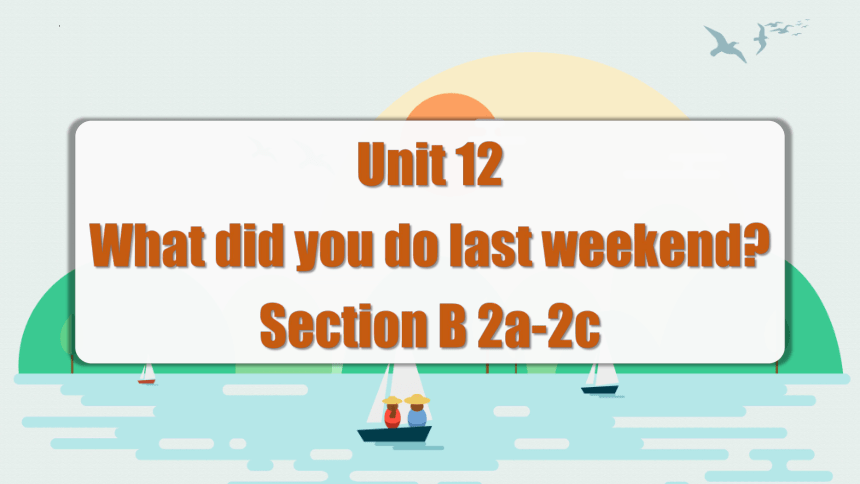 | |
| 格式 | zip | ||
| 文件大小 | 8.9MB | ||
| 资源类型 | 教案 | ||
| 版本资源 | 人教新目标(Go for it)版 | ||
| 科目 | 英语 | ||
| 更新时间 | 2023-04-14 10:31:44 | ||
图片预览


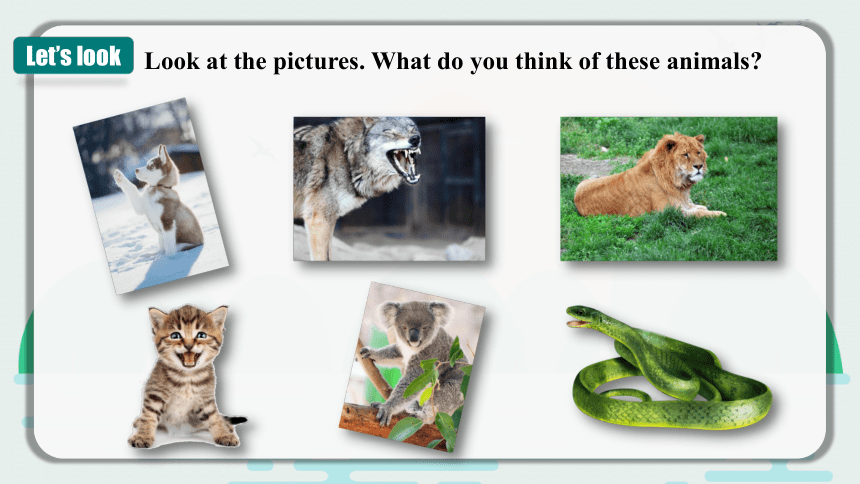
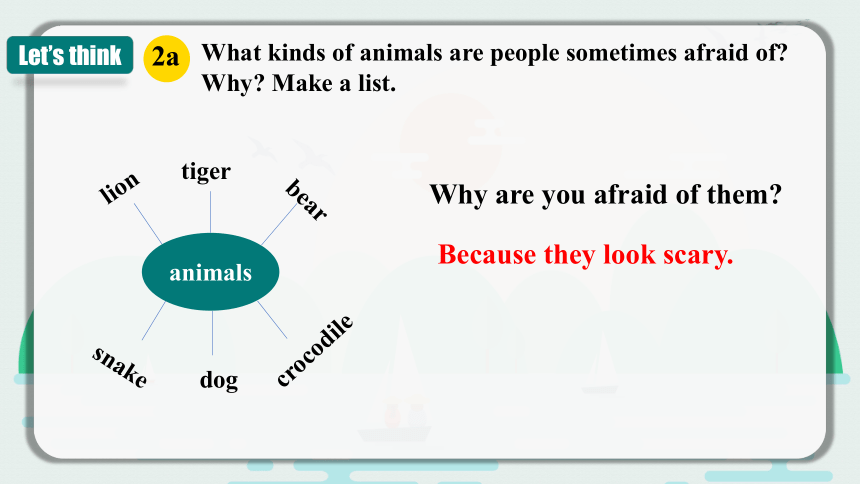
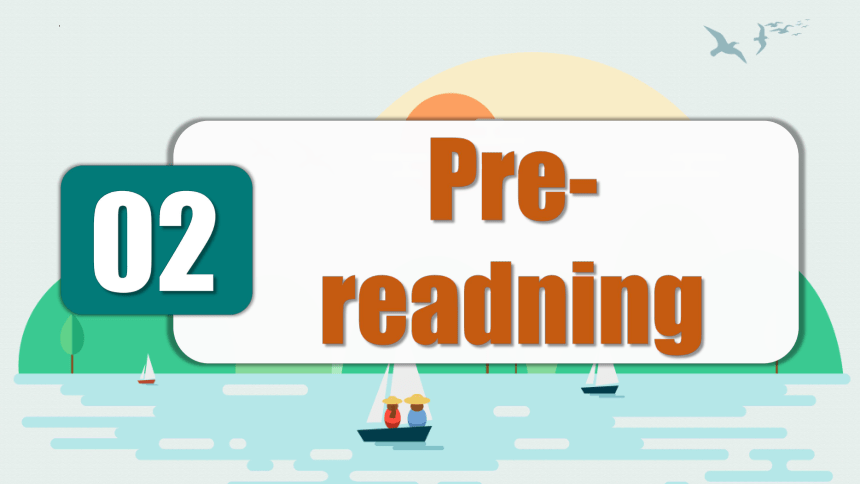
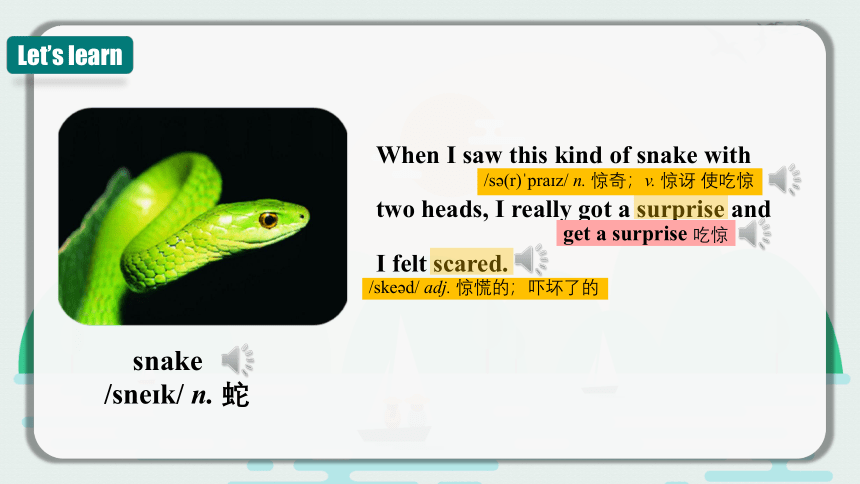
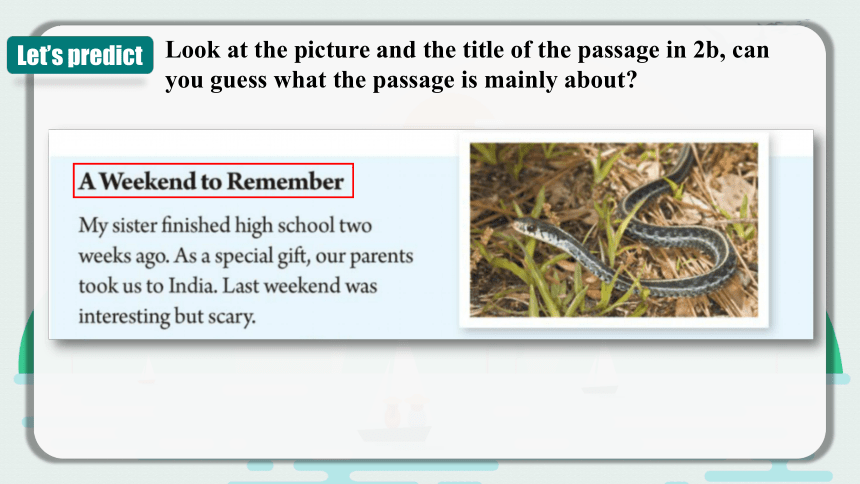
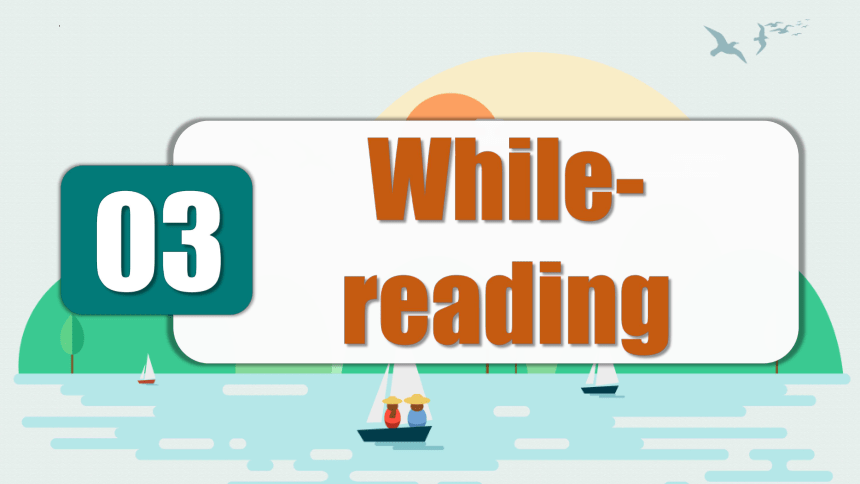
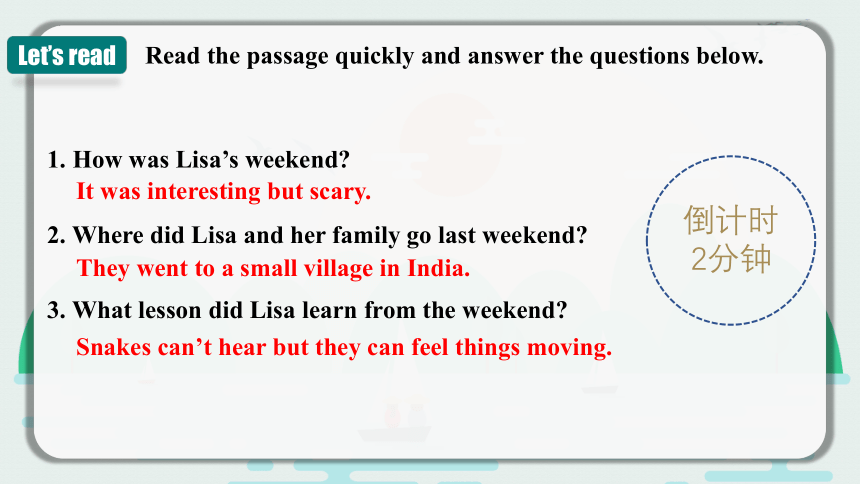
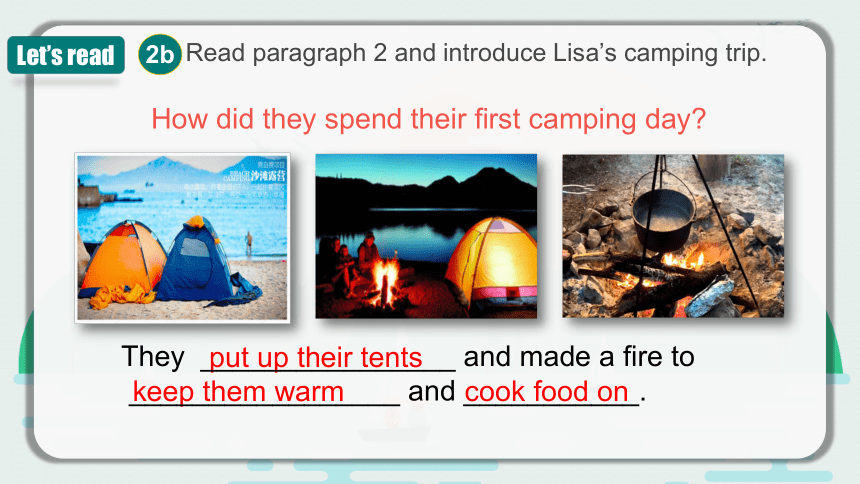
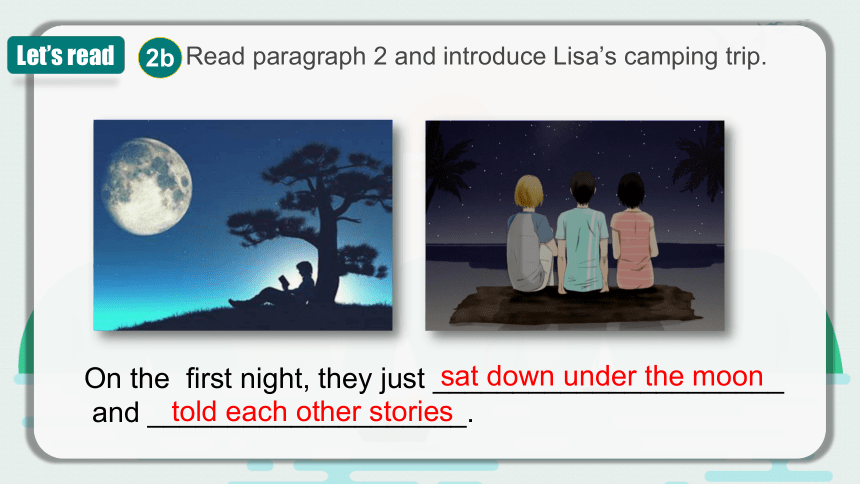

文档简介
(共35张PPT)
Unit 12
What did you do last weekend
Section B 2a-2c
01
Lead-in
Let’s look
Look at the pictures. What do you think of these animals
Let’s think
animals
snake
lion
dog
crocodile
bear
tiger
Why are you afraid of them
Because they look scary.
What kinds of animals are people sometimes afraid of
Why Make a list.
2a
02
Pre-readning
Let’s learn
snake
/sne k/ n. 蛇
When I saw this kind of snake with two heads, I really got a surprise and I felt scared.
/s (r) pra z/ n. 惊奇;v. 惊讶 使吃惊
get a surprise 吃惊
/ske d/ adj. 惊慌的;吓坏了的
Let’s predict
Look at the picture and the title of the passage in 2b, can you guess what the passage is mainly about
03
While-reading
Let’s read
Read the passage quickly and answer the questions below.
1. How was Lisa’s weekend
2. Where did Lisa and her family go last weekend
3. What lesson did Lisa learn from the weekend
It was interesting but scary.
They went to a small village in India.
Snakes can’t hear but they can feel things moving.
倒计时
2分钟
Let’s read
2b
Read paragraph 2 and introduce Lisa’s camping trip.
How did they spend their first camping day
put up their tents
keep them warm
cook food on
They ________________ and made a fire to
_________________ and ___________.
Let’s read
2b
Read paragraph 2 and introduce Lisa’s camping trip.
On the first night, they just ______________________
and ____________________.
sat down under the moon
told each other stories
Let’s read
2b
Read paragraph 3 and answer the questions.
when
where
feeling
the next morning
near the fire
Lisa was so_______ that
she couldn’t move.
Lisa and her sister got a
terrible _______.
Accident:
the snake
Lessons:
1. Snakes don’t have _____ but can feel
things ______.
2. It was important not to go _____ a lake.
Activities:
1. Lisa and her sister __________ their parents
2. Dad started to________ and down.
3. The snake woke up and it _________ the forest near
the lake.
shouted to
jump up
moved into
scared
surprise
ears
moving
near
Let’s read
Listen and read.
A Weekend to Remember
My sister finished high school two weeks ago. As a special gift, our parents took us to India. Last weekend was interesting but scary.
We went camping in a small village in India. First, we took a long bus ride to a lake in the countryside. There we put up our tents and made a fire to keep us warm and cook food on. On the first night, we just sat under the moon and told each other stories. But I was so tired that I went to sleep early.
/ha / adj.& adv. 高的(地)high school 中学
/ ɡ / adv. 以前
/ nd / n. 印度
搭起;举起
tent /tent/ n. 帐篷
生火
互相;彼此
/mu n/ n. 月亮
Let’s read
The next morning, my sister and I got a terrible surprise. When we looked out of our tent, we saw a big snake sleeping near the fire. I was so scared that I couldn’t move. We shouted to our parents to let them know about the danger. My dad started to jump up and down in their tent. This woke the snake up and it moved into the forest near the lake. My dad told me later that snakes don’t have ears but can feel things moving. He also told me it was important not to go near a snake. This was a very useful lesson for me.
/mu v/ v. 移动
shout to 对 …… 大声喊叫
start /stɑ (r)t/ v. 开始;着手
/d mp/ v. 跳;跃
上上下下;起伏
wake/ we k/ v. (woke/w k/ ) 弄醒;醒
/ ntu / prep. 到 …… 里面;进入
/ f r st/ / f r st/n. 森林
ear / // r/ n. 耳朵
get a surprise 吃惊
look out of 往外看
04
Post-reading
Let’s complete
交代背景
Para.1
时间: _____ _________
地点: _____________
人物: my parents, my sister and I
原因: my sister finished high school; as a________ ______
总结: Last weekend was . (引出下文)
last weekend
India
special gift
interesting but scary
A Weekend to Remember
详述经历
Para.2-3
took a long bus ride→____ ____ our tents, _____ ____fire
the first night: sat under the ______, told ____ ____ stories
the next morning: ____ ____ ________, saw a big ________
sleeping, so________, shouted to parents, Dad, ________
_____ ______ ______ the snake moved into the forest
it was important not to go near a snake
put up
made a
moon
each other
got a surprise
snake
scared
up and down
jumped
Let’s complete
Let’s put
_____ snake went into the forest
_____ put up our tents and cooked food
_____ learned a useful lesson
_____ saw a snake and shouted to parents for help
_____ snakes can’t hear but can feel things moving
_____ my dad jumped up and down in his tent
_____ took a bus to a small village in India
_____ told stories under the moon, then went to sleep
Put the phrases in order according to the passage.
Then use them to retell the story.
2c
1
6
2
8
4
7
5
3
Read the passage in 2b again and fill in the blanks.
Lisa’s family went to a small village in India to spend the weekend last week. There they _____ up tents and _____ a fire. On the first night, they _____ under the moon and _____ each other stories. The next morning, Lisa and her sister got a terrible _______. They saw a big snake. Lisa was so _____ that she couldn’t move. Then her father
______ up and down in the tents. This woke the snake up and it _____ into the forest near the lake.
put
made
sat
told
surprise
scared
jumped
moved
Let’s complete
Role-play
Work in groups of four. One is a reporter, the other three are Lisa, Lisa’s sister and her father. Make an interview about Lisa’s weekend in India.
These sentences may help you
Hello, Lisa. Where did you go last weekend
How was your trip
Who did you go with
How did you go there
What did you do there
...
05
Language Points
Language points
My sister finished high school two weeks ago.
我姐姐两周前中学毕 业了。(教材P71 2b)
【用法详解】(1) high作形容词,意为“高的” ,强调物体高出地面的空间高度。
The building is high. 这栋建筑很高。
(2) high作副词,意为“高地”。既可表示物理上的高,也可表示价格、价值、评价等抽象意义上的高。
He can jump very high. 他能跳很高。
You should aim high. 你应该志向远大。
high adj.& adv. 高的(地)
Point1
ago adv. 以前
Point2
【用法详解】ago作副词,不能单独使用,常用于“一段时间 + ago”结构,常与一般过去时连用。
He started to play the piano three years ago. 他三年前开始弹钢琴。
Language points
put up 搭起;举起
Point
【用法详解】put up在此意为“搭起”,是“动词 + 副词”型短语。其宾语为名词时,名词放在up之前或之后均可;宾语为代词时,代词要放在 put与up 之间。
It’s going to rain. Let’s put up the tent. 要下雨了。咱们把帐篷搭起来吧。
Here is the tent. Let’s put it up. 帐篷在这儿。咱们把它搭起来吧。
2. There we put up our tents and made a fire to keep us warm and cook food on.
在那里我们搭起帐篷,生火取暖并做饭。(教材P71 2b)
【拓展延伸】put up的其他常见含义:
put up
举起
张贴
He puts up his hand to ask a question.
他举起手来问问题。
They put up a notice on the wall.
他们在墙上贴了一张布告。
【图解助记】put up 的一词多义:
搭起 举起 张贴
Language points
3. But I was so tired that I went to sleep early.
但是我太累了,所以早早就睡了。(教材P71 2b)
【用法详解】so ... that ... 意为“如此…… 以至于 ……”,是固定结构,so 后接形容词或副词,that 后接句子表示结果。
Jim is so busy that he has little time for his family. 吉姆太忙了,以至于他几乎没有时间陪他的家人。
so... that... 结构
Point
【拓展延伸】so... that ... 后的从句为肯定句时,该结构可与 ... enough to ... 互相转化;其后的从句为否定句时,它可以与 too ... to ... 互相转化。
The boy got up so early that he caught the early bus. = The boy got up early enough to catch the early bus. 这个男孩起得很早,以至于他赶上了早班车。
He is so young that he can’t go to school. =He is too young to go to school.
他那么小,以至于不能去上学。
Language points
4. The next morning, my sister and I got a terrible surprise.
第二天早上,我和姐姐大吃一惊。 (教材P71 2b)
【用法详解】(1) surprise 在此处作名词,意为“惊奇,惊讶”。表示抽象事物时,用作不可数名词;表示具体事物时,用作可数名词。常用短语:
surprise n. 惊奇;惊讶 v. 使吃惊
Point
surprise
get a surprise 吃惊
give sb. a surprise 给某人一个惊喜
in surprise 惊奇地,惊讶地
to one’s surprise 让某人惊讶的是
I got a surprise when I saw the bill.
一看账单我吃了一惊。
They looked at each other in surprise.
他们惊讶地看着对方。
To my surprise, he didn’t pass the exam.
让我惊讶的是,他没有通过考试。
(2) surprise也可作及物动词,意为“使吃惊”。
The news surprised me a lot. 这消息使我非常惊讶。
Language points
5. When we looked out of our tent, we saw a big snake sleeping near
the fire. 我们向帐篷外看时,看到了一条大蛇正在篝火旁睡觉。(教材P71 2b)
【用法详解】look out of后接名词或代词,其反义短语为 look into。
The boy is looking out of the window. 这个男孩正在向窗外看。
【拓展延伸】look out意为“当心”,相当于 be careful。
Look out! Here comes a car. 当心!过来一辆小汽车。
look out of 向 ……外看
Point1
【用法详解】see sb./sth. doing sth. 意为“看见某人/某物正在做某事”,强调看到动作正在发生;而 see sb./sth. do sth. 意为“看到某人/某物做了某事”,强调看见动作发生的全过程,或者看到动作经常发生。
I saw him playing basketball at nine o’clock in the morning. 上午9点钟,我看到他正在打篮球。
I often see her read in the library. 我经常看到她在图书馆看书。
see sb./sth. doing sth. 看见某人/某物正在做某事
Point2
Language points
6. I was so scared that I couldn’t move.
我是那么害怕,一动都不敢动。(教材P71 2b)
【用法详解】scared作形容词,通常用来修饰人,常用结构有:
be scared of sth. /doing sth.害怕某物/做某事
be scared to do sth.害怕做某事
My cousin isn’t scared of snakes. 我堂姐不害怕蛇。
She is scared to climb the tree. 她害怕爬树。
scared adj. 惊慌的;吓坏了的
Point1
【拓展延伸】scary作形容词,意为“吓人的;恐怖的“,常用来修饰物。
The movie is scary. Can you watch it with me
这部电影很恐怖。你能和我一起看吗?
Language points
move v. 移动
Point2
【用法详解】move在句中作不及物动词,意为“移动”。move 作不及物动词时,还可意为“搬家,搬迁”,“move to + 地点名词”表示“搬到 ……”
Don’t move, or you’ll be in danger. 不要动,否则你会有危险。
We’ll move to the countryside next month. 我们下个月将搬到乡下。
6. I was so scared that I couldn’t move. 我是那么害怕,一动都不敢动。
(教材P71 2b)
【拓展延伸】move 也可作及物动词,意为“使 …… 移动” ,还可表示“使感动,打动”。
He moved his chair nearer the old man. 他把椅子移得离这个老人更近了一些。
His speech moved me to tears. 他的演讲让我感动得流泪。
Language points
7. This woke the snake up and it moved into the forest near the lake.
这一举动惊醒了蛇,它爬进了湖边的树林里。(教材P71 2b)
【用法详解】wake ... up 中的 wake作动词,意为“弄醒,醒”;up为副词。该短语为“动词 + 副词”型短语,当宾语是名词时,名词可以放在wake和up之间,也可以放在up的后面;当宾语是代词时,代词必须放在wake和up之间。
Wake up your brother. It’s time for breakfast. 把你弟弟叫醒。该吃早饭了。
I’ll wake you up for the medicine. 我会叫醒你吃药的。
wake... up 把…… 弄醒
Point
【拓展延伸】 wake up 还可作不及物动词短语,意为“醒,醒来”。
My grandma usually wakes up early. 我奶奶通常醒得早。
06
Exercise
Exercise
1. - How do you like the movie Kongfu Panda 3
- It’s ________ exciting ________ I’d like to see it again.
A. so/that B. such/that C. enough/to D. too/to
A
2. We looked at each other ________ surprise when we heard a bird singing “Happy Birthday to You”.
A. on B. at C. to D. in
D
07
Summary
Summary
A Weekend to Remember
交代背景
Para.1
详述经历
Para.2-3
时间: last weekend
地点: India
人物: my parents, my sister and I
原因: my sister finished high school; as a special gift
总结: Last weekend was interesting but scary. (引出下文)
took a long bus ride→put up our tents, made a fire
the first night: sat under the moon, told each other stories
the next morning: got a surprise, saw a big snake sleeping,
so scared, shouted to parents, Dad jumped up and down,
the snake moved into the forest
it was important not to go near a snake
08
Homework
1. Shadow read 2b.
2. Write down the interview.
3. Write down some phrases about your weekend activities.
Thanks for listening !
Unit 12
What did you do last weekend
Section B 2a-2c
01
Lead-in
Let’s look
Look at the pictures. What do you think of these animals
Let’s think
animals
snake
lion
dog
crocodile
bear
tiger
Why are you afraid of them
Because they look scary.
What kinds of animals are people sometimes afraid of
Why Make a list.
2a
02
Pre-readning
Let’s learn
snake
/sne k/ n. 蛇
When I saw this kind of snake with two heads, I really got a surprise and I felt scared.
/s (r) pra z/ n. 惊奇;v. 惊讶 使吃惊
get a surprise 吃惊
/ske d/ adj. 惊慌的;吓坏了的
Let’s predict
Look at the picture and the title of the passage in 2b, can you guess what the passage is mainly about
03
While-reading
Let’s read
Read the passage quickly and answer the questions below.
1. How was Lisa’s weekend
2. Where did Lisa and her family go last weekend
3. What lesson did Lisa learn from the weekend
It was interesting but scary.
They went to a small village in India.
Snakes can’t hear but they can feel things moving.
倒计时
2分钟
Let’s read
2b
Read paragraph 2 and introduce Lisa’s camping trip.
How did they spend their first camping day
put up their tents
keep them warm
cook food on
They ________________ and made a fire to
_________________ and ___________.
Let’s read
2b
Read paragraph 2 and introduce Lisa’s camping trip.
On the first night, they just ______________________
and ____________________.
sat down under the moon
told each other stories
Let’s read
2b
Read paragraph 3 and answer the questions.
when
where
feeling
the next morning
near the fire
Lisa was so_______ that
she couldn’t move.
Lisa and her sister got a
terrible _______.
Accident:
the snake
Lessons:
1. Snakes don’t have _____ but can feel
things ______.
2. It was important not to go _____ a lake.
Activities:
1. Lisa and her sister __________ their parents
2. Dad started to________ and down.
3. The snake woke up and it _________ the forest near
the lake.
shouted to
jump up
moved into
scared
surprise
ears
moving
near
Let’s read
Listen and read.
A Weekend to Remember
My sister finished high school two weeks ago. As a special gift, our parents took us to India. Last weekend was interesting but scary.
We went camping in a small village in India. First, we took a long bus ride to a lake in the countryside. There we put up our tents and made a fire to keep us warm and cook food on. On the first night, we just sat under the moon and told each other stories. But I was so tired that I went to sleep early.
/ha / adj.& adv. 高的(地)high school 中学
/ ɡ / adv. 以前
/ nd / n. 印度
搭起;举起
tent /tent/ n. 帐篷
生火
互相;彼此
/mu n/ n. 月亮
Let’s read
The next morning, my sister and I got a terrible surprise. When we looked out of our tent, we saw a big snake sleeping near the fire. I was so scared that I couldn’t move. We shouted to our parents to let them know about the danger. My dad started to jump up and down in their tent. This woke the snake up and it moved into the forest near the lake. My dad told me later that snakes don’t have ears but can feel things moving. He also told me it was important not to go near a snake. This was a very useful lesson for me.
/mu v/ v. 移动
shout to 对 …… 大声喊叫
start /stɑ (r)t/ v. 开始;着手
/d mp/ v. 跳;跃
上上下下;起伏
wake/ we k/ v. (woke/w k/ ) 弄醒;醒
/ ntu / prep. 到 …… 里面;进入
/ f r st/ / f r st/n. 森林
ear / // r/ n. 耳朵
get a surprise 吃惊
look out of 往外看
04
Post-reading
Let’s complete
交代背景
Para.1
时间: _____ _________
地点: _____________
人物: my parents, my sister and I
原因: my sister finished high school; as a________ ______
总结: Last weekend was . (引出下文)
last weekend
India
special gift
interesting but scary
A Weekend to Remember
详述经历
Para.2-3
took a long bus ride→____ ____ our tents, _____ ____fire
the first night: sat under the ______, told ____ ____ stories
the next morning: ____ ____ ________, saw a big ________
sleeping, so________, shouted to parents, Dad, ________
_____ ______ ______ the snake moved into the forest
it was important not to go near a snake
put up
made a
moon
each other
got a surprise
snake
scared
up and down
jumped
Let’s complete
Let’s put
_____ snake went into the forest
_____ put up our tents and cooked food
_____ learned a useful lesson
_____ saw a snake and shouted to parents for help
_____ snakes can’t hear but can feel things moving
_____ my dad jumped up and down in his tent
_____ took a bus to a small village in India
_____ told stories under the moon, then went to sleep
Put the phrases in order according to the passage.
Then use them to retell the story.
2c
1
6
2
8
4
7
5
3
Read the passage in 2b again and fill in the blanks.
Lisa’s family went to a small village in India to spend the weekend last week. There they _____ up tents and _____ a fire. On the first night, they _____ under the moon and _____ each other stories. The next morning, Lisa and her sister got a terrible _______. They saw a big snake. Lisa was so _____ that she couldn’t move. Then her father
______ up and down in the tents. This woke the snake up and it _____ into the forest near the lake.
put
made
sat
told
surprise
scared
jumped
moved
Let’s complete
Role-play
Work in groups of four. One is a reporter, the other three are Lisa, Lisa’s sister and her father. Make an interview about Lisa’s weekend in India.
These sentences may help you
Hello, Lisa. Where did you go last weekend
How was your trip
Who did you go with
How did you go there
What did you do there
...
05
Language Points
Language points
My sister finished high school two weeks ago.
我姐姐两周前中学毕 业了。(教材P71 2b)
【用法详解】(1) high作形容词,意为“高的” ,强调物体高出地面的空间高度。
The building is high. 这栋建筑很高。
(2) high作副词,意为“高地”。既可表示物理上的高,也可表示价格、价值、评价等抽象意义上的高。
He can jump very high. 他能跳很高。
You should aim high. 你应该志向远大。
high adj.& adv. 高的(地)
Point1
ago adv. 以前
Point2
【用法详解】ago作副词,不能单独使用,常用于“一段时间 + ago”结构,常与一般过去时连用。
He started to play the piano three years ago. 他三年前开始弹钢琴。
Language points
put up 搭起;举起
Point
【用法详解】put up在此意为“搭起”,是“动词 + 副词”型短语。其宾语为名词时,名词放在up之前或之后均可;宾语为代词时,代词要放在 put与up 之间。
It’s going to rain. Let’s put up the tent. 要下雨了。咱们把帐篷搭起来吧。
Here is the tent. Let’s put it up. 帐篷在这儿。咱们把它搭起来吧。
2. There we put up our tents and made a fire to keep us warm and cook food on.
在那里我们搭起帐篷,生火取暖并做饭。(教材P71 2b)
【拓展延伸】put up的其他常见含义:
put up
举起
张贴
He puts up his hand to ask a question.
他举起手来问问题。
They put up a notice on the wall.
他们在墙上贴了一张布告。
【图解助记】put up 的一词多义:
搭起 举起 张贴
Language points
3. But I was so tired that I went to sleep early.
但是我太累了,所以早早就睡了。(教材P71 2b)
【用法详解】so ... that ... 意为“如此…… 以至于 ……”,是固定结构,so 后接形容词或副词,that 后接句子表示结果。
Jim is so busy that he has little time for his family. 吉姆太忙了,以至于他几乎没有时间陪他的家人。
so... that... 结构
Point
【拓展延伸】so... that ... 后的从句为肯定句时,该结构可与 ... enough to ... 互相转化;其后的从句为否定句时,它可以与 too ... to ... 互相转化。
The boy got up so early that he caught the early bus. = The boy got up early enough to catch the early bus. 这个男孩起得很早,以至于他赶上了早班车。
He is so young that he can’t go to school. =He is too young to go to school.
他那么小,以至于不能去上学。
Language points
4. The next morning, my sister and I got a terrible surprise.
第二天早上,我和姐姐大吃一惊。 (教材P71 2b)
【用法详解】(1) surprise 在此处作名词,意为“惊奇,惊讶”。表示抽象事物时,用作不可数名词;表示具体事物时,用作可数名词。常用短语:
surprise n. 惊奇;惊讶 v. 使吃惊
Point
surprise
get a surprise 吃惊
give sb. a surprise 给某人一个惊喜
in surprise 惊奇地,惊讶地
to one’s surprise 让某人惊讶的是
I got a surprise when I saw the bill.
一看账单我吃了一惊。
They looked at each other in surprise.
他们惊讶地看着对方。
To my surprise, he didn’t pass the exam.
让我惊讶的是,他没有通过考试。
(2) surprise也可作及物动词,意为“使吃惊”。
The news surprised me a lot. 这消息使我非常惊讶。
Language points
5. When we looked out of our tent, we saw a big snake sleeping near
the fire. 我们向帐篷外看时,看到了一条大蛇正在篝火旁睡觉。(教材P71 2b)
【用法详解】look out of后接名词或代词,其反义短语为 look into。
The boy is looking out of the window. 这个男孩正在向窗外看。
【拓展延伸】look out意为“当心”,相当于 be careful。
Look out! Here comes a car. 当心!过来一辆小汽车。
look out of 向 ……外看
Point1
【用法详解】see sb./sth. doing sth. 意为“看见某人/某物正在做某事”,强调看到动作正在发生;而 see sb./sth. do sth. 意为“看到某人/某物做了某事”,强调看见动作发生的全过程,或者看到动作经常发生。
I saw him playing basketball at nine o’clock in the morning. 上午9点钟,我看到他正在打篮球。
I often see her read in the library. 我经常看到她在图书馆看书。
see sb./sth. doing sth. 看见某人/某物正在做某事
Point2
Language points
6. I was so scared that I couldn’t move.
我是那么害怕,一动都不敢动。(教材P71 2b)
【用法详解】scared作形容词,通常用来修饰人,常用结构有:
be scared of sth. /doing sth.害怕某物/做某事
be scared to do sth.害怕做某事
My cousin isn’t scared of snakes. 我堂姐不害怕蛇。
She is scared to climb the tree. 她害怕爬树。
scared adj. 惊慌的;吓坏了的
Point1
【拓展延伸】scary作形容词,意为“吓人的;恐怖的“,常用来修饰物。
The movie is scary. Can you watch it with me
这部电影很恐怖。你能和我一起看吗?
Language points
move v. 移动
Point2
【用法详解】move在句中作不及物动词,意为“移动”。move 作不及物动词时,还可意为“搬家,搬迁”,“move to + 地点名词”表示“搬到 ……”
Don’t move, or you’ll be in danger. 不要动,否则你会有危险。
We’ll move to the countryside next month. 我们下个月将搬到乡下。
6. I was so scared that I couldn’t move. 我是那么害怕,一动都不敢动。
(教材P71 2b)
【拓展延伸】move 也可作及物动词,意为“使 …… 移动” ,还可表示“使感动,打动”。
He moved his chair nearer the old man. 他把椅子移得离这个老人更近了一些。
His speech moved me to tears. 他的演讲让我感动得流泪。
Language points
7. This woke the snake up and it moved into the forest near the lake.
这一举动惊醒了蛇,它爬进了湖边的树林里。(教材P71 2b)
【用法详解】wake ... up 中的 wake作动词,意为“弄醒,醒”;up为副词。该短语为“动词 + 副词”型短语,当宾语是名词时,名词可以放在wake和up之间,也可以放在up的后面;当宾语是代词时,代词必须放在wake和up之间。
Wake up your brother. It’s time for breakfast. 把你弟弟叫醒。该吃早饭了。
I’ll wake you up for the medicine. 我会叫醒你吃药的。
wake... up 把…… 弄醒
Point
【拓展延伸】 wake up 还可作不及物动词短语,意为“醒,醒来”。
My grandma usually wakes up early. 我奶奶通常醒得早。
06
Exercise
Exercise
1. - How do you like the movie Kongfu Panda 3
- It’s ________ exciting ________ I’d like to see it again.
A. so/that B. such/that C. enough/to D. too/to
A
2. We looked at each other ________ surprise when we heard a bird singing “Happy Birthday to You”.
A. on B. at C. to D. in
D
07
Summary
Summary
A Weekend to Remember
交代背景
Para.1
详述经历
Para.2-3
时间: last weekend
地点: India
人物: my parents, my sister and I
原因: my sister finished high school; as a special gift
总结: Last weekend was interesting but scary. (引出下文)
took a long bus ride→put up our tents, made a fire
the first night: sat under the moon, told each other stories
the next morning: got a surprise, saw a big snake sleeping,
so scared, shouted to parents, Dad jumped up and down,
the snake moved into the forest
it was important not to go near a snake
08
Homework
1. Shadow read 2b.
2. Write down the interview.
3. Write down some phrases about your weekend activities.
Thanks for listening !
同课章节目录
- Unit 1 Can you play the guitar?
- Section A
- Section B
- Unit 2 What time do you go to school?
- Section A
- Section B
- Unit 3 How do you get to school?
- Section A
- Section B
- Unit 4 Don't eat in class.
- Section A
- Section B
- Unit 5 Why do you like pandas?
- Section A
- Section B
- Unit 6 I'm watching TV.
- Section A
- Section B
- Review of Units 1-6
- Unit 7 It's raining!
- Section A
- Section B
- Unit 8 Is there a post office near here?
- Section A
- Section B
- Unit 9 What does he look like?
- Section A
- Section B
- Unit 10 I'd like some noodles.
- Section A
- Section B
- Unit 11 How was your school trip?
- Section A
- Section B
- Unit 12 What did you do last weekend?
- Section A
- Section B
